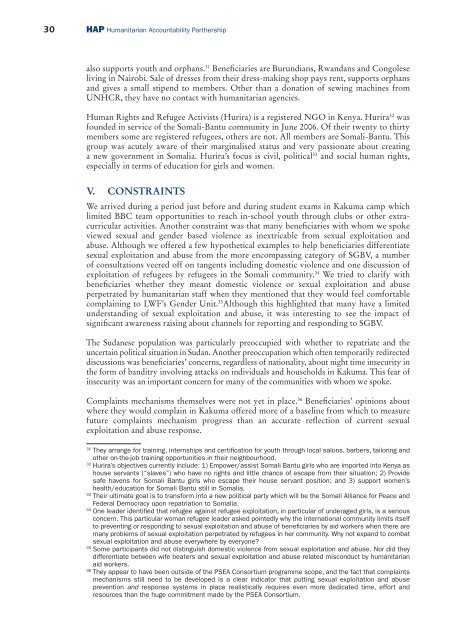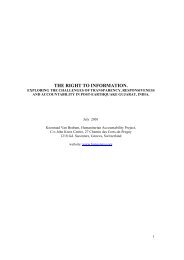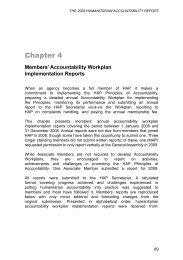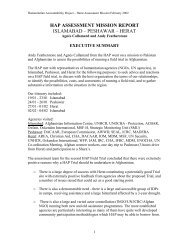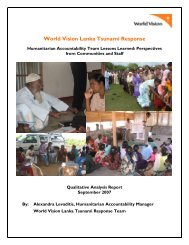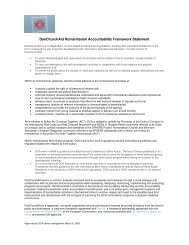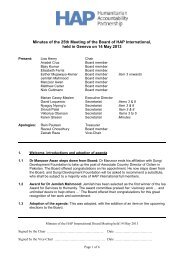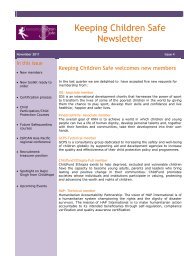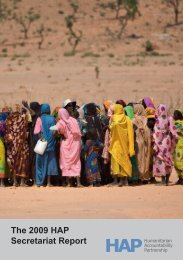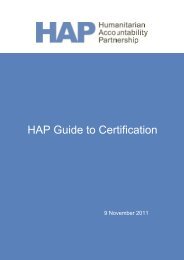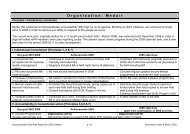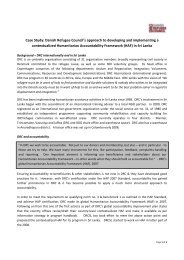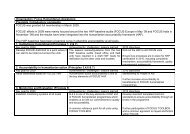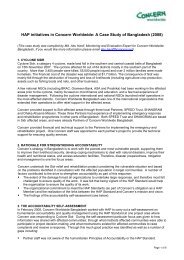TO COMPLAIN OR NOT TO COMPLAIN: STILL THE QUESTION ...
TO COMPLAIN OR NOT TO COMPLAIN: STILL THE QUESTION ...
TO COMPLAIN OR NOT TO COMPLAIN: STILL THE QUESTION ...
You also want an ePaper? Increase the reach of your titles
YUMPU automatically turns print PDFs into web optimized ePapers that Google loves.
30 HAP Humanitarian Accountability Parthership<br />
also supports youth and orphans. 31 Beneficiaries are Burundians, Rwandans and Congolese<br />
living in Nairobi. Sale of dresses from their dress-making shop pays rent, supports orphans<br />
and gives a small stipend to members. Other than a donation of sewing machines from<br />
UNHCR, they have no contact with humanitarian agencies.<br />
Human Rights and Refugee Activists (Hurira) is a registered NGO in Kenya. Hurira 32 was<br />
founded in service of the Somali-Bantu community in June 2006. Of their twenty to thirty<br />
members some are registered refugees, others are not. All members are Somali-Bantu. This<br />
group was acutely aware of their marginalised status and very passionate about creating<br />
a new government in Somalia. Hurira’s focus is civil, political 33 and social human rights,<br />
especially in terms of education for girls and women.<br />
V. CONSTRAINTS<br />
We arrived during a period just before and during student exams in Kakuma camp which<br />
limited BBC team opportunities to reach in-school youth through clubs or other extracurricular<br />
activities. Another constraint was that many beneficiaries with whom we spoke<br />
viewed sexual and gender based violence as inextricable from sexual exploitation and<br />
abuse. Although we offered a few hypothetical examples to help beneficiaries differentiate<br />
sexual exploitation and abuse from the more encompassing category of SGBV, a number<br />
of consultations veered off on tangents including domestic violence and one discussion of<br />
exploitation of refugees by refugees in the Somali community. 34 We tried to clarify with<br />
beneficiaries whether they meant domestic violence or sexual exploitation and abuse<br />
perpetrated by humanitarian staff when they mentioned that they would feel comfortable<br />
complaining to LWF’s Gender Unit. 35 Although this highlighted that many have a limited<br />
understanding of sexual exploitation and abuse, it was interesting to see the impact of<br />
significant awareness raising about channels for reporting and responding to SGBV.<br />
The Sudanese population was particularly preoccupied with whether to repatriate and the<br />
uncertain political situation in Sudan. Another preoccupation which often temporarily redirected<br />
discussions was beneficiaries’ concerns, regardless of nationality, about night time insecurity in<br />
the form of banditry involving attacks on individuals and households in Kakuma. This fear of<br />
insecurity was an important concern for many of the communities with whom we spoke.<br />
Complaints mechanisms themselves were not yet in place. 36 Beneficiaries’ opinions about<br />
where they would complain in Kakuma offered more of a baseline from which to measure<br />
future complaints mechanism progress than an accurate reflection of current sexual<br />
exploitation and abuse response.<br />
31<br />
They arrange for training, internships and certifi cation for youth through local salons, barbers, tailoring and<br />
other on-the-job training opportunities in their neighbourhood.<br />
32<br />
Hurira’s objectives currently include: 1) Empower/assist Somali Bantu girls who are imported into Kenya as<br />
house servants (“slaves”) who have no rights and little chance of escape from their situation; 2) Provide<br />
safe havens for Somali Bantu girls who escape their house servant position; and 3) support women’s<br />
health/education for Somali Bantu still in Somalia.<br />
33<br />
Their ultimate goal is to transform into a new political party which will be the Somali Alliance for Peace and<br />
Federal Democracy upon repatriation to Somalia.<br />
34<br />
One leader identifi ed that refugee against refugee exploitation, in particular of underaged girls, is a serious<br />
concern. This particular woman refugee leader asked pointedly why the international community limits itself<br />
to preventing or responding to sexual exploitation and abuse of benefi ciaries by aid workers when there are<br />
many problems of sexual exploitation perpetrated by refugees in her community. Why not expand to combat<br />
sexual exploitation and abuse everywhere by everyone?<br />
35<br />
Some participants did not distinguish domestic violence from sexual exploitation and abuse. Nor did they<br />
differentiate between wife beaters and sexual exploitation and abuse related misconduct by humanitarian<br />
aid workers.<br />
36<br />
They appear to have been outside of the PSEA Consortium programme scope, and the fact that complaints<br />
mechanisms still need to be developed is a clear indicator that putting sexual exploitation and abuse<br />
prevention and response systems in place realistically requires even more dedicated time, effort and<br />
resources than the huge commitment made by the PSEA Consortium.


